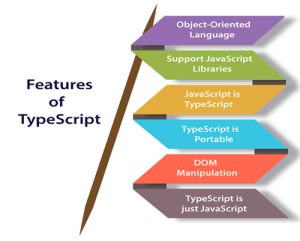TypeScript: Unleashing the Power of Strongly Typed JavaScript
In the realm of modern web development, JavaScript is ubiquitous. It’s the language that powers interactivity on the web, making it an essential tool for front-end and back-end developers alike. However, JavaScript’s dynamic nature can lead to unexpected errors and debugging challenges in large-scale projects. Enter TypeScript, a superset of JavaScript that brings the benefits of static typing to the world’s most popular scripting language. In this comprehensive guide, we’ll dive deep into TypeScript, exploring its foundations, key features, advantages, and real-world applications.
Understanding TypeScript
TypeScript is an open-source programming language developed by Microsoft. It extends JavaScript by adding static typing to the language, which means developers can define the data types of variables, parameters, and return values. These type annotations provide a safety net during development, catching errors before they reach production code.
 Key Features of TypeScript
Key Features of TypeScript
- Static Typing: TypeScript introduces static typing, allowing developers to specify the type of variables, function parameters, and return values. This helps catch type-related errors at compile time rather than runtime.
- Type Inference: TypeScript includes a powerful type inference system that can often determine types even without explicit annotations. This strikes a balance between strong typing and developer convenience.
- Interfaces: TypeScript supports the creation of interfaces, enabling developers to define the structure of objects or classes. This promotes code reusability and ensures that objects adhere to a specific contract.
- Enums: Enums allow developers to define a set of named constant values, making code more readable and self-explanatory. They are particularly useful for representing categories or status codes.
- Classes: TypeScript supports class-based object-oriented programming, providing a familiar structure for developers coming from languages like Java or C#. Classes can include properties, methods, and constructors.
- Decorators: Decorators are a powerful feature for modifying classes, methods, properties, or parameters during runtime. They’re commonly used in frameworks like Angular to add metadata to classes.
- TypeScript Compiler: TypeScript code is transpiled into JavaScript using the TypeScript compiler (tsc). This allows developers to write TypeScript and still run it in any JavaScript environment, making it highly compatible.
Benefits of TypeScript
- Enhanced Error Checking: TypeScript’s static typing catches common programming errors early in the development process, reducing the likelihood of runtime errors.
- Improved Code Maintainability: Strong typing and interfaces make code more self-documenting, making it easier for developers to understand and maintain large codebases.
- IDE Support: TypeScript is well-supported in modern Integrated Development Environments (IDEs) like Visual Studio Code, which provides features like autocompletion and type checking as you write code.
- Better Collaboration: When multiple developers work on a project, TypeScript’s type annotations provide a clear contract for how functions and objects should behave, reducing misunderstandings.
- Large-Scale Project Management: TypeScript is particularly valuable in large-scale applications where complex data structures and intricate interactions between components can lead to subtle bugs. It helps ensure code quality and reliability.
- Ecosystem Integration: TypeScript has strong support in the JavaScript ecosystem, with many popular libraries and frameworks offering TypeScript typings, making it easy to use these tools seamlessly.
Real-World Applications
TypeScript has made a significant impact across various domains and industries:
- Front-End Development: TypeScript is commonly used in front-end development, especially in Angular applications. The framework itself is written in TypeScript, and Angular projects benefit greatly from strong typing.
- Back-End Development: Node.js, a popular back-end runtime, has strong support for TypeScript. This allows developers to use TypeScript to write server-side code, benefiting from the language’s features.
- Mobile App Development: TypeScript can be used in mobile app development with technologies like React Native. It brings the advantages of static typing to mobile app development, reducing runtime errors.
- Game Development: Game engines like Phaser provide TypeScript support, making it easier to create games with complex interactions and game logic.
- Cloud Services: TypeScript is suitable for building cloud-based applications, allowing developers to leverage strong typing in their serverless functions and microservices.
Getting Started with TypeScript
If you’re eager to explore TypeScript, here are some steps to begin your journey:
- Installation: Install TypeScript globally on your machine using npm (Node Package Manager) by running
npm install -g typescript. - Code Editor: Choose a code editor that supports TypeScript well. Visual Studio Code is a popular choice, and it offers a seamless TypeScript development experience.
- Create a tsconfig.json File: In your project’s root directory, run
tsc --initto create atsconfig.jsonfile. This file configures the TypeScript compiler and allows you to customize compilation settings. - Writing TypeScript: Start writing TypeScript code by creating
.tsfiles. You can use the TypeScript compiler to transpile your code to JavaScript usingtsc filename.ts. - Type Definitions: To utilize TypeScript with external libraries or frameworks, you may need to install type definitions. This can be done with npm or yarn using
npm install @types/librarynameoryarn add @types/libraryname. - Compile and Run: After writing your TypeScript code, compile it using
tscfollowed by the filename. Then, run the generated JavaScript file as you would with any JavaScript code.
Conclusion
TypeScript brings a new level of confidence and reliability to JavaScript development. With its static typing, type inference, and rich set of features, TypeScript empowers developers to write safer and more maintainable code, reducing the chances of runtime errors. Its adoption in various domains, including front-end and back-end development, mobile app development, and cloud services, demonstrates its versatility and practicality. Whether you’re a seasoned developer looking to level up your JavaScript skills or a newcomer eager to embark on a coding journey, TypeScript offers a powerful platform to build modern and robust applications with clarity and precision. So, dive in, explore, and start writing TypeScript code with confidence and creativity.

